
 |
|
|
|
Did you know that Julie Christie's TV debut was in a TV drama called A for Andromeda, in which she plays a woman constructed from a computer diagram sent by aliens from outer space? David Lean must not have known the show, for when he was asked how he found his Lara for Doctor Zhivago, he remembered seeing this incredible young woman walking carefree down the sidewalk in some forgotten movie... The movie Lean must have been recalling is Billy Liar, an award-winner by John Schlesinger; Christie plays a self-assured Northern girl with the courage to pursue living in a way that the leading character Tom Courtenay cannot. Christie, Schlesinger and playwright-author Frederic Raphael then proceeded to 1965's Darling, a rather cold movie about a fashion model that made Christie a top international star. The three teamed once more on Far from the Madding Crowd, a pastoral classic surely made because MGM was eager to get the star of Zhivago back on the screen in a period romance. 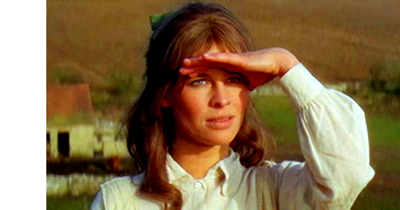
The faithful adaptation of Thomas Hardy's 1874 epic follows a format strikingly similar to supermarket-rack romance novels. Primarily a poet, Hardy stated that he wrote the novel as a way of making a living. But it is also an authentic picture of the hardships and social conventions of rural English life. The title is an archaic expression meaning, "away from the frenzied life in the city". It's chronically misspelled as "maddening". Readers of Hardy will recognize the spirit of the book, if not its depth. In the farm country of South West England a spirited beauty must deal with the amorous attentions of three very different suitors. Bathsheba Everdene (Julie Christie) is not a wealthy woman, but she's determined to choose a man for love instead of simple security. Shepherd Gabriel Oak (Alan Bates) is disappointed when Bathsheba turns down his proposal. Suddenly made penniless by a cruel trick of fate, Gabriel wanders for several months before taking a job as shepherd on a large estate. His master turns out to be none other than Bathsheba, who has just inherited the farm from an uncle. Now just an employee, Gabriel must swallow his pride when the wealthy William Boldwood (Peter Finch) visits and falls deeply in love with his new neighbor. Bathsheba does her polite best to discourage him as well. As Boldwood's obsession grows, she meets the man of her dreams, the handsome soldier Frank Troy (Terence Stamp). Frank has no interest in farm work but Bathsheba could not be happier. The panicked Boldwood tries to bribe his rival to move on, only to find out that Frank and Bathsheba have already married. 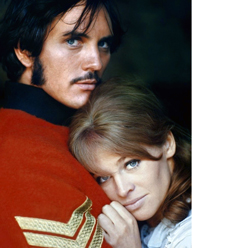
Far from the Madding Crowd's episodic structure is ready-made for the movies, with the same "cliffhanger" moments that made it popular as a newspaper serial in 1874. A crazy sheepdog runs an entire herd over a cliff. Bathsheba foolishly sends a valentine to Boldwood that reads, "Marry Me". Storms and fires threaten the farms. Troy dazzles Bathsheba with a stunning display of swordsmanship, slashing within inches of her face. One suitor decides to commit suicide by walking into the sea. A desperately hoped-for engagement party so disappoints another suitor that he resorts to violence. The best-remembered scene is Frank Troy's swordplay seduction of Bathsheba, employing fast cutting and dissolves to emphasize the soldier's stunning appeal. Julie Christie has the correct expression on her face, but the sudden cinematic fireworks communicate only the surface flash, not the all-consuming fire Hardy says has been lit. Bathsheba seems not a woman shaken to her roots, but a teenager with a crush. This seems especially so when she loses control of her emotions in the presence of her trusted servant, Liddy (Fiona Walker). 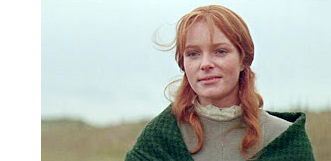
The story's most resonant subplot involves a good maid named Fanny Robin (Prunella Ransome), who loves and almost marries Frank Troy. A tragic wedding-day mistake leads Fanny to a terrible end reminiscent in tone to Hardy's later Tess of the d'Urbervilles. The memory of Fanny haunts Frank almost like a gothic curse. The movie was considered by many to be a disappointment, and although Julie Christie's performance lacks nothing the role did not further elevate her stardom. Schlesinger and Raphael wanted to billboard the story, not the movie stars, a gambit that would be unthinkable today (think Keira Knightley). Bathsheba Everdeen is a credible characterization, not a Super Woman for All Seasons. Viewers expecting bodice-ripping sex may be disappointed by the discretion shown in Bathsheba and Frank's love scenes. Dramatic situations are not lacking, but Crowd doesn't signal melodramatic turns with bombastic music. Nobody appears at the curtain to deliver moral verdicts on the characters. 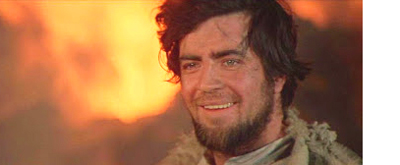
"At home by the fire, whenever I look up, there you will be. And whenever you look up, there I shall be." Movies about strong women who drive a selection of suitors (usually three) to distraction are rarely this even-handed. Think of Johnny Guitar, where the weirdly masculine Joan Crawford scrambles the hormones of the title character, an outlaw called The Dancin' Kid, and an inexperienced boy. With just a little indecision, the impulsive Bathsheba Everdene visits disaster on three males. The eligible Squire Boldwood's passion becomes so intense that it might as well be a psychosis. He collects gifts to his "future bride" and his distraction so sickens him that he allows his crops to be destroyed in a storm. Some of us will side with the patient Gabriel Oak and his offer of a lifetime of affectionate companionship and loyalty. Oak finds his contentment, but the final shot's zoom to a toy soldier shows us where Bathsheba's heart really lies. The dashing Frank Troy is the closest the story comes to a villain. Investing little of himself, he accepts Bathsheba's worship as a matter of course. Yet he proves to have a conscience when it comes to the luckless Fanny Robin. When Frank arrives to reclaim Bathsheba, it's up to us to decide if he's turned a new leaf or is simply reclaiming his property. Far from the Madding Crowd doesn't telegraph "correct" interpretations of its characters' motivations. 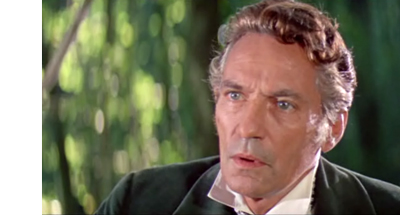
John Schlesinger's portrait of country life is rich and vibrant. Bathsheba refuses to be patronized at the agrarian markets, while Gabriel must wait on line to beg for work from the visiting landowners. William Boldwood must cajole his farmhands into operating a newfangled threshing machine, quite a mechanical marvel for the 1860s. Period songs play a big role at the parties Bathesheba throws for her workers. The film recreates an elaborate period circus, featuring an exciting performance built around the penny-dreadful character "Dick Turpin, the Highwayman Rogue". With its quartet of superior performances, Far from the Madding Crowd has aged better than most of MGM's Road Show attractions from the 1960s. As Schlesinger purposely blocks an easy interpretation of Bathsheba's intentions, her romantic dilemma makes for good post-screening debate: which is the better suitor, and why? Is Bathsheba Everdene to be blamed for being indecisive and fickle, or are her problems just the result of bad luck? The Warner Archive Collection Blu-ray of Far from the Madding Crowd replicates the contents of the previous DVD release, complete with Richard Rodney Bennett's overture, intermission and exit music. It's the same full-length cut, the International Version, which is three minutes longer. The new footage is said to be a from a bloody cockfight sequence attended by Terence Stamp's character. 1 In the theater, I remember cinematographer Nicolas Roeg's images looking on the warm side, and perhaps a trifle desaturated in scenes not featuring green woods. This transfer has a rich and satisfying appearance, especially the scenes in the fields that appear to reproduce famous paintings. But the scan colorists may have had to compensate for a faded negative, for some of the colors seem a bit flat. Original prints were in 70mm with six-track stereo, and the disc offers a remastered DD 5.1 mix. 
A featurette extra is an original show called Location: Far from the Madding Crowd. Ms. Christie does her duty, riding to the set in a car for the cameraman. The original trailer included announces that Bathsheba "gave herself to three men", which is true only in the verbal sense -- we're talking about a lady, after all. Christie ought to be proud of Far from the Madding Crowd; it's a classy and intelligent show and an excellent adaptation of Thomas Hardy. It's less intense than Roman Polanski's Tess, but also a lot less depressing.
On a scale of Excellent, Good, Fair, and Poor,
Far from the Madding Crowd Blu-ray rates:
Footnote: 1. The Warner Archive Collection's George Feltenstein gets specific on Far from the Madding Crowd, January 31, 2009: Hi Glenn --- It's very confusing. There were MANY versions of this picture. What is good to confirm is that THIS is the complete road show version as originally released in the UK.
The cockfight was never part of the domestic release. The original negative for the cockfight sequence is marked "Int'l version only". When our mastering group was working on the picture, they indicated that (in addition to the 'cockfight' sequence), there were a few additional shots added that were less than a minute in total. The circumstances are further confused by the fact that the domestic release was cut and then cut again, so there were actually three different domestic versions, but all were shorter than what opened in the UK. I hope that helps! Best, GF

Reviews on the Savant main site have additional credits information and are often updated and annotated with reader input and graphics. T'was Ever Thus.
Review Staff | About DVD Talk | Newsletter Subscribe | Join DVD Talk Forum |
| ||||||||||||||||||